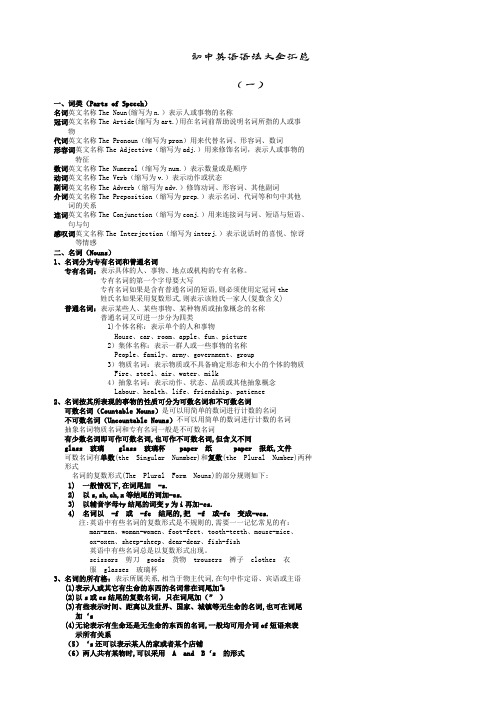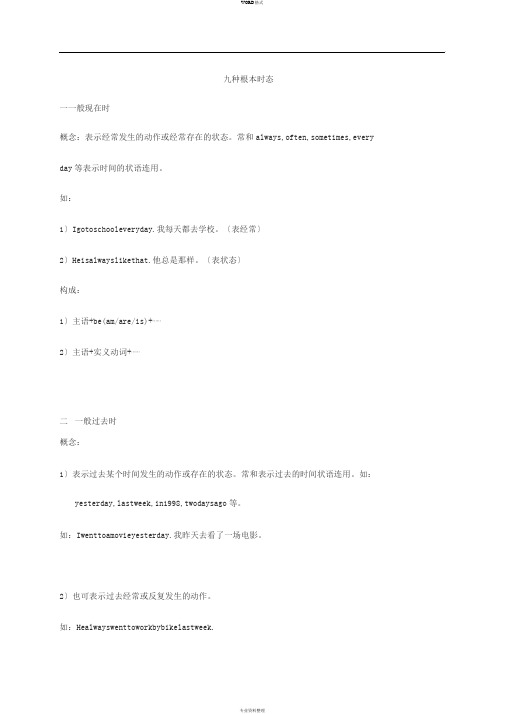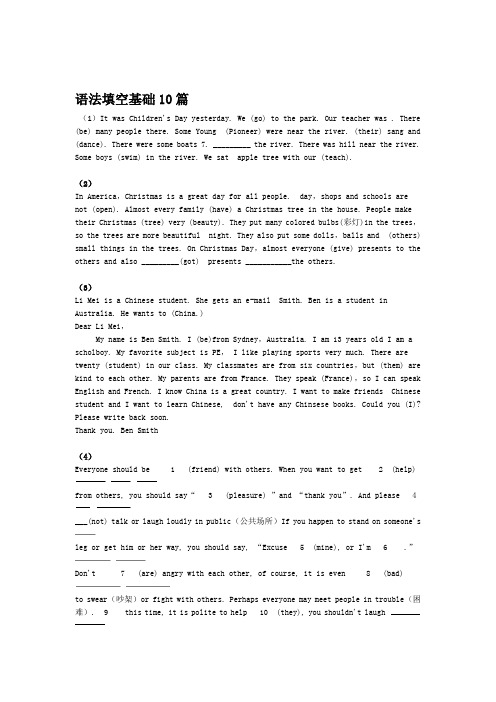初中英语语法专题(合集12篇)
初中英语语法总结大全(精华版)

初中英语语法总结大全学习提纲一、词类、句子成分和构词法:1、词类:英语词类分十种:名词、形容词、代词、数词、冠词、动词、副词、介词、连词、感叹词。
1、名词(n.):表示人、事物、地点或抽象概念的名称。
如:boy, morning, bag, ball, class, orange.2、代词(pron.):主要用来代替名词。
如:who, she, you, it .3、形容词(adj..):表示人或事物的性质或特征。
如:good, right, white, orange .4、数词(num.):表示数目或事物的顺序。
如:one, two, three, first, second, third, fourth.5、动词(v.):表示动作或状态。
如:am, is,are,have,see .6、副词(adv.):修饰动词、形容词或其他副词,说明时间、地点、程度等。
如:now, very, here,often, quietly, slowly.7、冠词(art..):用在名词前,帮助说明名词。
如:a, an, the.8、介词(prep.):表示它后面的名词或代词与其他句子成分的关系。
如in, on, from, above, behind.9、连词(conj.):用来连接词、短语或句子。
如and, but, before .10、感叹词(interj..)表示喜、怒、哀、乐等感情。
如:oh, well, hi, hello.2、句子成分:英语句子成分分为七种:主语、谓语、宾语、定语、状语、表语、宾语补足语。
1、主语是句子所要说的人或事物,回答是“谁”或者“什么”。
通常用名词或代词担任。
如:I‘m Miss Green.(我是格林小姐)2、谓语动词说明主语的动作或状态,回答“做(什么)”。
主要由动词担任。
如:Jack cleansthe room every day. (杰克每天打扫房间)3、表语在系动词之后,说明主语的身份或特征,回答是“什么”或者“怎么样”。
初中英语语法专题讲座12——介词

这三个介词都可以表示地点,意思是“在……上”,但具体含义有所不同。
⑴on是指与物体表面接触而不是在其上方。例如:They are sittingonthe grass.他们坐在草地上。Do you liveonthe second floor?[美国英语]你住在二楼吗?/[英国英语]你住在三楼吗?He jumpedonthe horse.他跳上了马。
⑵介词短语用作宾语补足语,例如:I was surprised to find himon the bus.发现他在公共汽车上,我很吃惊。Please make yourselfat home.请随便一点,不要拘束。
⑶介词短语用作后置定语,例如:The girlin the hatis my sister.那个头戴帽子的女孩是我的妹妹。Do you like the jacketon the left?你喜欢左边的那件短上衣吗?Did you see the housewith many trees around it?你看到那座周围长满树的房子了吗?
7.instead, instead of:
⑴instead不是介词,而是副词。它的意思是“作为代替;(不……)而”,中文译法灵活。instead常位于句末。例如:He was ill, so I wentinstead.他病了,因此我就(代他)去了。I don’t like this one; please give me thatinstead.我不喜欢这一个,请把那一个给我。They don’t have beef; let’s have some fishinstead.他们没有牛肉,我们改吃鱼吧。
2.during, in:
两者用作介词时均与表示一般时间的名词连用,意为“在…期间”,一般情况下能相互换用。但是,在实际运用中应注意下面几点:
初中英语语法精编[整理版]-39页精选文档
![初中英语语法精编[整理版]-39页精选文档](https://img.taocdn.com/s3/m/148f2f3cf78a6529647d53ae.png)
初中英语语法大全语法网络图一.名词I.II. 名词的数:1. 规则名词的复数形式:名词的复数形式,一般在单数形式后面加-s或-es。
现将构成方法III. 名词的所有格:名词在句中表示所有关系的语法形式叫做名词所有格。
所有格分两种:一是名词词尾加’s 构成,二是由介词of加名词构成。
前者多表示有生命的东西,后者多表示无生命的东西。
3. of所有格的用法:用于无生命的东西:the legs of the chair, the cover of the book用于有生命的东西,尤其是有较长定语时:the classrooms of the first-year students 用于名词化的词:the struggle of the oppressed二.冠词冠词分为不定冠词(a, an),定冠词(the),和零冠词。
I.不定冠词的用法:三.代词:I.代词可以分为以下七大类:II. 不定代词用法注意点:1. one, some与any:1) one可以泛指任何人,也可特指,复数为ones。
some多用于肯定句,any多用于疑问句和否定句。
One should learn to think of others.Have you any bookmarks? No, I don’t have any bookm arks.I have some questions to ask.2) some可用于疑问句中,表示盼望得到肯定的答复,或者表示建议,请求等。
Would you like some bananas?Could you give me some money?3) some 和any修饰可数名词单数时,some表示某个,any表示任何一个。
I have read this article in some magazine.Please correct the mistakes, if any.4) some和数词连用表示“大约”,any可与比较级连用表示程度。
(完整版)初中英语语法大全汇总

初中英语语法大全汇总(一)一、词类(Parts of Speech)名词英文名称The Noun(缩写为n.)表示人或事物的名称冠词英文名称The Artide(缩写为art.)用在名词前帮助说明名词所指的人或事物代词英文名称The Pronoun(缩写为pron)用来代替名词、形容词、数词形容词英文名称The Adjective(缩写为adj.)用来修饰名词,表示人或事物的特征数词英文名称The Numeral(缩写为num.)表示数量或是顺序动词英文名称The Verb(缩写为v.)表示动作或状态副词英文名称The Adverb(缩写为adv.)修饰动词、形容词、其他副词介词英文名称The Preposition(缩写为prep.)表示名词、代词等和句中其他词的关系连词英文名称The Conjunction(缩写为conj.)用来连接词与词、短语与短语、句与句感叹词英文名称The Interjection(缩写为interj.)表示说话时的喜悦、惊讶等情感二、名词(Nouns)1、名词分为专有名词和普通名词专有名词:表示具体的人、事物、地点或机构的专有名称。
专有名词的第一个字母要大写专有名词如果是含有普通名词的短语,则必须使用定冠词the姓氏名如果采用复数形式,则表示该姓氏一家人(复数含义) 普通名词:表示某些人、某些事物、某种物质或抽象概念的名称普通名词又可进一步分为四类1)个体名称:表示单个的人和事物House、car、room、apple、fun、picture2)集体名称:表示一群人或一些事物的名称People、family、army、government、group3)物质名词:表示物质或不具备确定形态和大小的个体的物质 Fire、steel、air、water、milk4)抽象名词:表示动作、状态、品质或其他抽象概念Labour、health、life、friendship、patience2、名词按其所表现的事物的性质可分为可数名词和不可数名词可数名词(Countable Nouns)是可以用简单的数词进行计数的名词不可数名词(Uncountable Nouns)不可以用简单的数词进行计数的名词抽象名词物质名词和专有名词一般是不可数名词有少数名词即可作可数名词,也可作不可数名词,但含义不同glass 玻璃glass 玻璃杯paper 纸paper 报纸,文件可数名词有单数(the Singular Nunmber)和复数(the Plural Number)两种形式名词的复数形式(The Plural Form Nouns)的部分规则如下:1) 一般情况下,在词尾加-s.2) 以s,sh,ch,x等结尾的词加-es.3) 以辅音字母+y结尾的词变y为i再加-es.4) 名词以-f 或-fe 结尾的,把-f 或-fe 变成-ves.注:英语中有些名词的复数形式是不规则的,需要一一记忆常见的有:man-men、woman-women、foot-feet、tooth-teeth、mouse-mice、ox-oxen、sheep-sheep、dear-dear、fish-fish英语中有些名词总是以复数形式出现。
精品推荐:初中英语语法15个专题汇总(带习题和答案)

目录专题一名词 (1)专题二数词、冠词 (8)专题三介词、连词 (14)专题四代词 (21)专题五形容词、副词 (31)专题六动词的分类 (40)专题七情态动词、系动词 (47)专题八动词时态 (54)专题九被动语态 (60)专题十非谓语动词 (67)专题十一简单句、并列句 (77)专题十二祈使句、感叹句 (85)专题一三宾语从句 (91)专题一四定语从句 (99)专题一五状语从句 (106)专题一名词1.名词的数1.概述: 名词按其表示的事物的性质分为可数名词和不可数名词。
2.可数名词及其单复数:可数名词有单复数变化,其前通常用不定冠词和数词来修饰,还可用many, few, a few, some, any, plenty of, lots of, a number of 等修饰。
构成名词复数形式的方法分为规则法和不规则法两种。
1)复数的规则构成法:绝大多数英语中的名词复数都是在单数名词后加上词尾-s或-es构成的。
具体规则如下图:规则例词一般情况下加-s apple-apples, ruler-rulers以s, x, ch,sh,结尾的加-es bus-buses, box-boxes, watch-watches,brush-brushescity-cities, county-countries以辅音字母加y结尾的,把y变成i再加-esknife-knives, leaf-leaves以f或fe结尾的,把f或fe变成v,再加-es以o结尾的,有的词尾加-es,有的加-s 在初中英语范围内加-es的主要有以下4个:tomato-tomatoes,potato-potatoesHero-heroes, Negro-Negroes2) 复数的不规则构成法:a.单复同形的:Chinese-Chinese, Japanese-Japanese, deer-deer, sheep-sheep, fish-fish(表示鱼的数量)b. 熟记下列词的复数变化:man-men, woman-women, policeman-policemen, foot-feet,tooth-teeth, mouse-mice, child-childrenc. 以man, woman做定语构成的复合名词,变复数时要全变: a man teacher-two men teachers; 其他情况一般只变主体名词而作定语的名词不变: a girl student-two girlstudents3. 不可数名词:不可数名词没有单复数。
英语语法(优秀3篇)

英语语法(优秀3篇)初中英语语法常用大全篇一1) 在代词what, which, who, none, some, any, more, most, all等词的单复数由其指代的词的单复数决定。
All is right.(一切顺利。
)All are present.(所有人都到齐了。
)2) 集体名词作主语时,谓语的数要根据主语的意思来决定。
如family, audience, crew, crowd, class, company, committee等词后用复数形式时,意为这个集体中的各个成员,用单数时表示该个集体。
His family isn#39;t very large.他家不是一个大家庭。
His family are music lovers.他的家人都是音乐爱好者。
但集合名词people, police, cattle, poultry等在任何情况下都用复数形式。
Are there any police around?3)有些名词,如variety, number, population, proportion, majority 等有时看作单数,有时看作复数。
A number of +名词复数+复数动词。
The number of +名词复数+单数动词。
A number of books have lent out.The majority of the students like English.初中英语语法大全篇二一。
词法1、名词(1)名词的可数与不可数可数名词指表示的人或事物可以用数来计量,它有单数与复数两种形式。
不可数名词指所表示的事物不能用数来计量。
物质名词与抽象名词一般无法用数目,来统计,都成为不可数名词。
不可数名词前一般不能用冠词a、an来表示数量,没有复数形式。
要表示“一个……”这一概念,就须加a piece of这一类短语。
要注意许多名词在汉语里看来是可数名词,在英语里却不可数。
初中英语语法大全-打印版

九种根本时态一一般现在时概念:表示经常发生的动作或经常存在的状态。
常和always,often,sometimes,every day等表示时间的状语连用。
如:1〕Igotoschooleveryday.我每天都去学校。
〔表经常〕2〕Heisalwayslikethat.他总是那样。
〔表状态〕构成:1〕主语+be(am/are/is)+⋯⋯2〕主语+实义动词+⋯⋯二一般过去时概念:1〕表示过去某个时间发生的动作或存在的状态。
常和表示过去的时间状语连用。
如:yesterday,lastweek,in1998,twodaysago等。
如:Iwenttoamovieyesterday.我昨天去看了一场电影。
2〕也可表示过去经常或反复发生的动作。
如:Healwayswenttoworkbybikelastweek.构成:1)主语+be(was/were)+⋯⋯2)主语+实义动词过去式+⋯⋯三现在进展时概念:表示现在〔说话瞬间〕正在进展或发生的动作。
如:Heissinging.TheyarewatchingTVnow.构成:主语+助动词be(am/are/is)+动词-ing形式构成。
四过去进展时概念:表示过去某一时刻或某一段时间正在进展的动作。
这一特定的过去时间除了有上下文暗示外,一般用时间状语来表示。
如:1〕---Whatwereyoudoing?---Iwasjumping.2)---WhatwastheboydoingwhentheUFOarrived?---Hewassleeping.构成:主语+助动词be(was/were)+动词-ing形式构成。
五一般将来时概念:表示将来某个时间要发生的动作或存在的状态,也表示将来经常或反复发生的动作,常与表示将来的时间状语连用。
如:tomorrow,nextweek,nextyear,inthefuture等。
如:Hewillgoshoppingtomorrow.Theyaregoingtoplaybasketballnextweek.构成:1〕主语+助动词will+动词原形+⋯⋯2〕主语+begoingto+动词原形+⋯⋯六过去将来时概念:表示在过去将来的某一时间发生的动作或存在的状态。
初中英语语法填空专题10篇

语法填空基础10篇(1)It was Children's Day yesterday. We (go) to the park. Our teacher was . There (be) many people there. Some Young (Pioneer) were near the river. (their) sang and (dance). There were some boats 7. _________ the river. There was hill near the river. Some boys (swim) in the river. We sat apple tree with our (teach).(2)In America,Christmas is a great day for all people. day,shops and schools are not (open). Almost every family (have) a Christmas tree in the house. People make their Christmas (tree) very (beauty). They put many colored bulbs(彩灯)in the trees,so the trees are more beautiful night. They also put some dolls,balls and (others) small things in the trees. On Christmas Day,almost everyone (give) presents to the others and also _________(got) presents ___________the others.(3)Li Mei is a Chinese student. She gets an e-mail Smith. Ben is a student in Australia. He wants to (China.)Dear Li Mei,My name is Ben Smith. I (be)from Sydney,Australia. I am 13 years old I am a scholboy. My favorite subject is PE, I like playing sports very much. There are twenty (student) in our class. My classmates are from six countries,but (them) are kind to each other. My parents are from France. They speak (France),so I can speak English and French. I know China is a great country. I want to make friends Chinese student and I want to learn Chinese, don't have any Chinsese books. Could you (I)? Please write back soon.Thank you. Ben Smith(4)Everyone should be 1 (friend) with others. When you want to get 2 (help)from others, you should say“ 3 (pleasure) ”and “thank you”. And please 4___(not) talk or laugh loudly in public(公共场所)If you happen to stand on someone'sleg or get him or her way, you should say, “Excuse 5 (mine), or I'm 6 .”Don't 7 (are) angry with each other, of course, it is even 8 (bad)to swear(吵架)or fight with others. Perhaps everyone may meet people in trouble(困难). 9 this time, it is polite to help 10 (they), you shouldn't laughat them.(5)Some people go to bed late at night and get up late the morning.This is not good for (they). Morning is the time for exercise. Exercise (mean) doing things with the body. Walking, (run), jumping and playing (be) all exercise. Exercise keeps us (health). Exercise helps the blood to (move) around the body. Blood takes food to all (part) of the body. This is very (importance) . So get up early and have exercise every morning can help (we) to keep healthy.(6)Mark Twain was famous as a public speaker. In his speeches he always liked to tell 1._______ (fun) stories. He also liked ( learn) to funny stories and play 3. (joke)on his friends. One day, one of his friends 4. (lose) his wallet and asked himto 5. (buy) a railway ticket for him. Mark Twain told his friend that he didn'thave enough money (pay) both tickets. He asked his friend to hide 7. his seat.(late), when the conductor (售票员) came to check the tickets, Mark Twain gave him two-one for 9. (he) and one for his friend. Then he said in a loud voice, “Myfriend is a strange man, when he travels on a train, he doesn't like to sit on the (sit), but he likes to lie on the floor under the seat. ”(7)Uncle Zhang is engineer of a factory. He is fifty (year) old. He (like) making things. He makes many different (thing). Then he wants to make a plane.do you want to fly to? asks (he) wife. Do you want to汦?潴?流牥捩湡?America? Who (want) to fly to America? No, I want to fly to Beijing. I want to show 桴獩瀠慬敮?桴?桃湩獥?数灯敬??慷瑮琠?敳?潨?栨楥桧??挠湡映祬尮(8)The Holidays are (come). Many students are planning(做计划)for the holiday.Kate's father is (get) back to London on May (one). Kate is going to the airport(飞机场)to say goodbye to him. Kate's aunt is coming to visit (she). Kate is goingto meet her the train station in the afternoon.Mike is going to play football with his friends. They are going to have a (matches) with Class Two. They hope they can (won) the game.Joe and his family are going to park. They are going to boat the lake and ride horses. Lily is going to watch TV and listen to (musican), and do some reading, too.I think all of (they) will have a good time.(9)While traveling in Russia, Ed Jackson ran short of(缺少)money. So he 1(write) to his brother, asking for $500. “Send the money 2 telegram(电报)to the bank(银行)here,” he wrote. After a week Ed began 3 (visit) thebank. He 4 (show) his passport(护照)to the bank clerk(职员). “Nothing______5____(have) come for you, Mr. Jackson,” he was told.This went on for three weeks, and Mr. Jackson got very 6 (worry). He thenphoned his brother, asking where the money 7 (be). The brother said it had been sent three _ 8 (week) before. That evening Ed Jackson was arrested(被捕)for 9(fail) to pay his hotel bill(账单). He tried to tell the police what his problem was, but no one would believe him. At last he was 10 (send) to the police stationfor fifteen days.(10).Mr King taught English in a middle school. He was very 1. (business)all the time and couldn't do some 2. (rest). So he left the school and (open)a book shop in the 4. (central) of the town. It wasn't big enough but all thebooks were nice and most people liked to buy some there. When the shop was 5. (close), he could read at home. He knew a lot and they learned(有学问的)person were glad to make 6. (friendly) with him.It was Sunday and it was cold outside. Mr King was very busy. At nine in theevening all the buyers 7. (leave) except a girl. She was dressed up and waited for 8. (some) there. Standing by the shelves, she looked over the books one_9_______ another. It made them in a fearful mess(凌乱不堪). Mr King came up toher and asked, “Excuse me, madam. What can I do for you?”“Your books are alldull(乏味的),” said the girl, “I want a delicious one.”“That's easy,” MrKing smiled. He 10. (take) out a cookbook(烹调书)and said, “Here you are, madam.”1) 2. with 3. were 4. Pioneers 5. They 8. swam 9. under10. Teacher2)【On open has trees beautiful at other gives gets from】3)【from chinese am because students they French with but me】4)【 2. help 3. please 4. don't 5. me 9. At 10. them】5)【in them means running are healthy move parts important us】6)【funny to learn jokes lost buy to pay under Later himself seat】7)【an years likes things Where his America wants to high】coming getting 1wrote by st her at match win on music them8)visiting/to visit showed has worried was weeks【9)】failing sent【busy rest opened centre closed friends left someone 10)after took】。
- 1、下载文档前请自行甄别文档内容的完整性,平台不提供额外的编辑、内容补充、找答案等附加服务。
- 2、"仅部分预览"的文档,不可在线预览部分如存在完整性等问题,可反馈申请退款(可完整预览的文档不适用该条件!)。
- 3、如文档侵犯您的权益,请联系客服反馈,我们会尽快为您处理(人工客服工作时间:9:00-18:30)。
初中英语语法专题(合集12篇)初中英语语法专题第1篇feel do 感觉某人做了某事have do 使某人做某事hear do 听见某人做某事let do 让某人做某事listen to do 听着某人做某事look at do 看着某人做了某事make do 使某人做某事notice do 注意某人做了某事observe do 观察某人做了某事see do 看见某人做了某事watch do 观察某人做了某事初中英语语法专题第2篇(1) remember to do 记住要做某事remember doing 记住曾做过某事(2) forget to do 忘记要做某事forget doing 忘记曾做过某事(3) regret to do 后悔(遗憾)要做某事regret doing 后悔(遗憾)曾做过某事(4) try to do 努力去做某事try doing 尝试做某事(5) mean to do 打算做某事mean doing 意味着做某事(6) can’t help to do 不能帮助做某事can’t help doing 禁不住做某事(7) go on to do 做完某事后接着做另一事go on doing 继续做一直在做的事初中英语语法专题第3篇like to do sth / like doing 喜欢做某事love to do sth / love doing 喜欢做某事hate to do sth / hate doing 憎恨做某事prefer to do sth / prefer doing 宁可做某事begin to do sth / begin doing 开始做某事continue to do sth / continue doing 继续做某事can’t bear to do sth / can’t bear doing 不能忍受做某事 bother to do sth / bother doing 麻烦做某事intend to do sth / intend doing 打算做某事attempt to do sth / attempt doing 试图做某事cease to do sth / cease doing 停止做某事初中英语语法专题第4篇名词一、英语名词可分专有名词和普通名词两大类:1、专有名词是个别的人、地、物、团体、机构等的专用名称。
专有名词中实词的第一个字母要大写。
如:Beijing, Tom, the People’s Republic of China(中华人民共和国)专有名词如果是含有普通名词的短语,则必须使用定冠词the。
如:the Great Wall(长城)姓氏名如果采用复数形式,则表示该姓氏一家人(复数含义),如:the Greens( 格林一家人)。
2、普通名词是许多人或事物的共有名称。
如:pupil, family, man,普通名词又分为可数名词和不可数名词。
▲可数名词是可以用简单的数词进行计数的名词,如: box, child, orange;▲不可数名词是不可以用简单的数词进行计数的名词。
如:water, news, oil, population, information .二、英语可数名词的单复数:英语可数名词有单数和复数两种形式。
1、名词由单数变复数的基本方法如下:①在单数名词词尾加s。
如:map → maps,boy→ boys,horse→horses, table→②s,o,x ,sh,ch结尾的词加如:class→classes, box→boxes, hero →heroes, dish→dishes, bench→[注]:少数以o结尾的词,变复数时只加s。
如:photo→photos, piano →③以辅音字母加y结尾的名词,变y为i,再加es。
如:family→families, city→cities, party→④以f或fe结尾的名词,变f或fe为v,再加es。
如:shelf→shelves, wolf→wolves, life→lives, knife→2、不规则变化:man→men, woman→women, sheep→sheep,tooth→teeth, fish→fish, child→children, ox→oxen, goose→geese 不可数名词一般没有复数形式,说明其数量时,要用有关计量名词。
如:a bag of rice→two bags of rice, a piece of paper→three pieces of paper, a bottle of milk→five bottles of三、名词所有格:1、名词所有格表示所属关系,相当于物主代词,在句中作定语、宾语或主语。
其构成法如下:(1)表示人或其它有生命的东西的名词常在词尾加’s。
如:Childern’s Day(儿童节), my sister’s book(我姐姐的书)(2)以s或es结尾的复数名词。
只在词尾加’。
如:Teachers’ Day(教师节)(3)有些表示时间、距离以及世界、国家、城镇等无生命的名词,也可在词尾加’如:today’s newspaper(今天的报纸), ten minutes’ break(十分钟的课间休息),China’s population(中国的人口).(4)无论表示有生命还是无生命的东西的名词,一般均可用介词of短语来表示所有关系。
如:a fine daughter of the Party(党的好女儿).2、[注解]:①‘s还可以表示某人的家或者某个店铺,如:my aunt’s(我阿姨家), the doctor’s(诊所)②两人共有某物时,可以采用 A and B’s 的形式,如:Lucy and Lily’s bedroom(露西和丽丽合住的卧室)③“of+名词所有格/名词性物主代词”,称为双重所有格,如:a friend of my father’s(我父亲的一位朋友), a friend of mine(我的一位朋友)四、名词或代词作主语时和谓语之间的单复数的一致问题1、谓语和谓语基本保持单复数的一致,即:主语是可数名词单数或不可数名词时,谓语动词用单数形式:如:The computer was a great (计算机是个了不起的发明)The water in the glass is very (玻璃杯里的水很冷)2、集体名词(如family, class, team, group, row, police, school 等)做句子主语时,①如果表示整体概念,则谓语用单数形式,如:Class Three is a very good (三班是好班)②如果表示其中的所有成员时,则谓语用复数形式,如:Class Three have a map of (三班有张中国地图)3、Chinese, Japanese, fish, sheep, people等表示单个时谓语用单数,表示许多时,谓语用复数。
如:There is a sheep in the (院子里有只绵羊) / There are some sheep in the (院子里有一些绵羊)4、maths, news等虽然有s结尾,但不是复数,因此谓语仍用单数:The news is very (这个消息令人兴奋)5、glasses, shoes, socks, trousers, gloves等名词往往用复数形式,故谓语用复数。
如:The trousers are very cheap and I want to take (裤子很便宜,我想买)6、a lot of 后跟名词复数时谓语用复数形式,跟不可数名词时谓语用单数形式。
如:A lot of students are playing baseball (现在有许多学生在打垒球) A lot of time was wasted on that (大量的时间花在了那个工作上)(被动句)7、and 连接两个名词做主语时,谓语原则上用复数,但是两个名词若构成一个整体事物时,谓语则用单数。
如:The teacher and his son are picking apples (老师和他的儿子在摘苹果) /Fish and chips is very famous (鱼和薯条是一种出名的食品)8、 there be 句型中be的单复数一般由靠近的名词决定。
如:There is a table and four chairs in the (房间里有一张桌子和四张椅子) 9、用both…and…连接两个事物做主语时,谓语一般用复数。
如:Both you and I are required to be here (你和我明天要求都来)10、主语中含有with的短语时,谓语单复数由with之前的人物决定。
如:A woman with a 7-year-old child was standing at the side of the (一名妇女带着一个七岁的孩子(当时)就站在路边)11、either…or…或者neither…nor…连接两个人物做句子主语时,谓语采用就近原则。
如:Either you or he is (要么是你对,要么是他对。
/你和他有一个人是对的) / Neither you nor I am going (你和我都不打算去那里)12、表示一段时间或长度概念的复数名词做主语时,谓语一般用单数。
如:Two months is not a short (两个月不是个短时间)Two thousandkilometers is quite a long distance(距离).(两千千米是相当长的一段距离)13、主语中含有half of… / (three quarters)of… / all (of) the ….等词语时,谓语的单复数由名词确定,如:Over three quarters of the information on the Internet is in (因特网上四分之三以上的信息是用英语写的) / A third of the students were playing near the (学生的三分之一(当时)正在湖边玩耍) / All of the water in these rivers has been (这些河流中的水已经被污染了)(被动句)但是,population一词又有特殊情况:What’s the population of China?(中国人口是多少?)(句子用单数) / Three quarters of the population in this city are Arabs(阿拉伯人).(这个城市四分之三的人口是阿拉伯人)(句子用复数)五、部分名词用法辨析:1、sport、game、match、race 的区别:sport通常指“户外运动”,以锻炼为主,概念较大;game意思是“运动、比赛”,不管户内户外还是脑力体力,指以胜负为主的运动;match意为“竞赛、比赛”,多指正式比赛;race主要表示“赛跑、赛马、赛车”。
